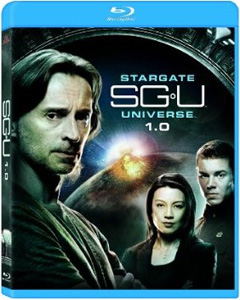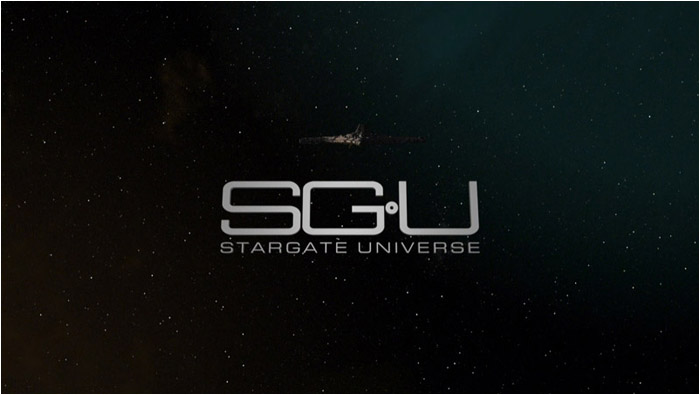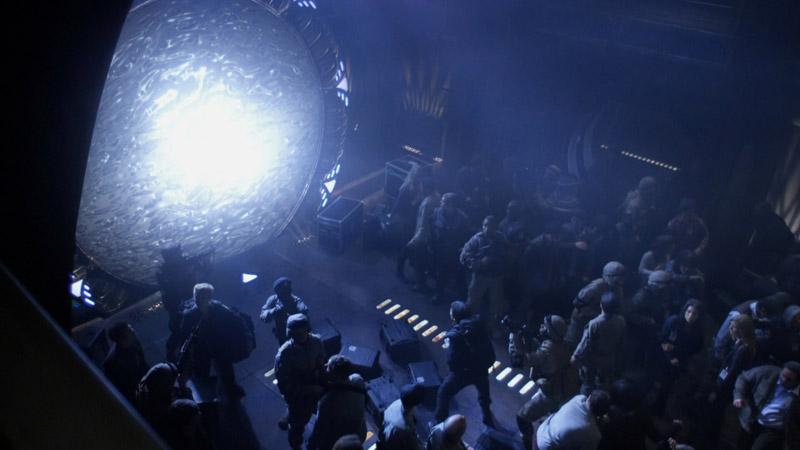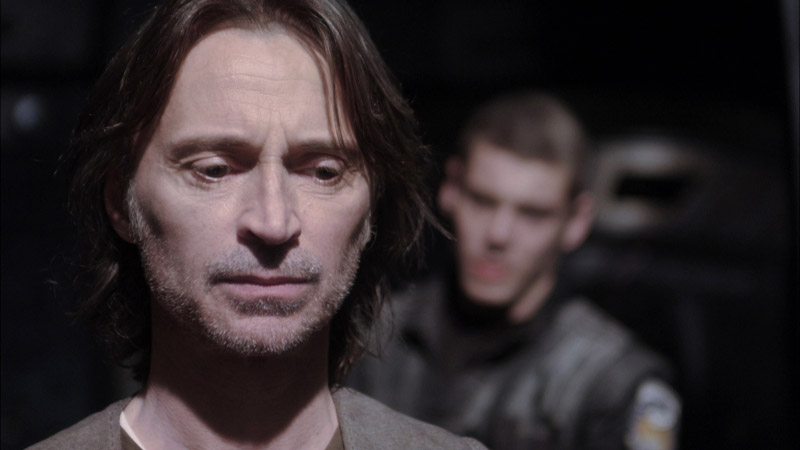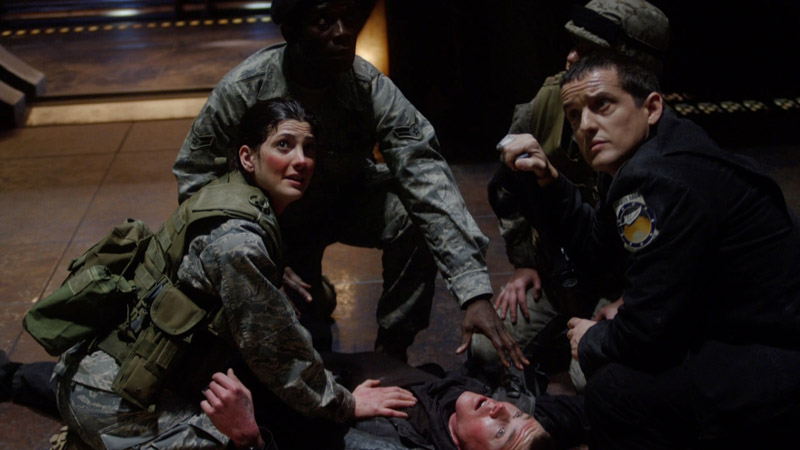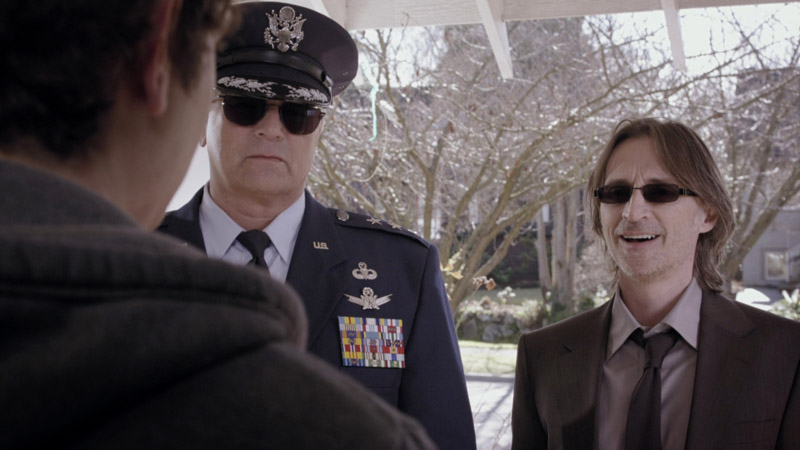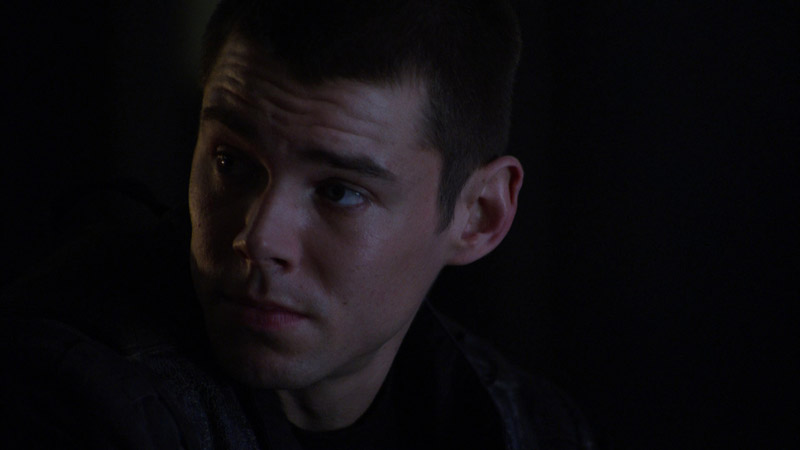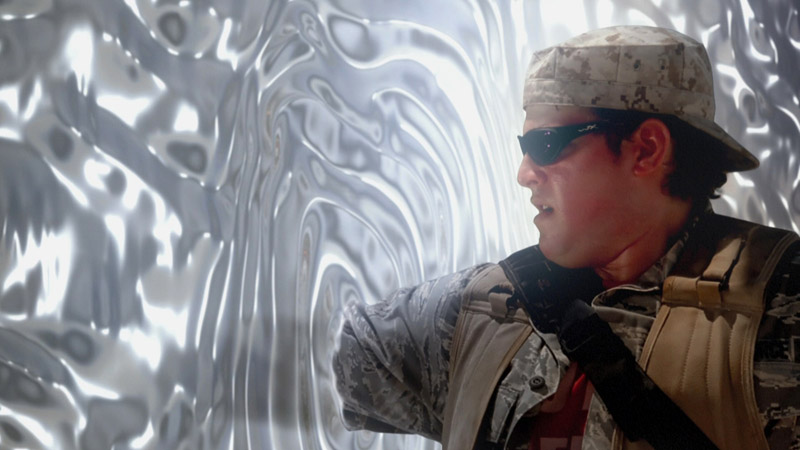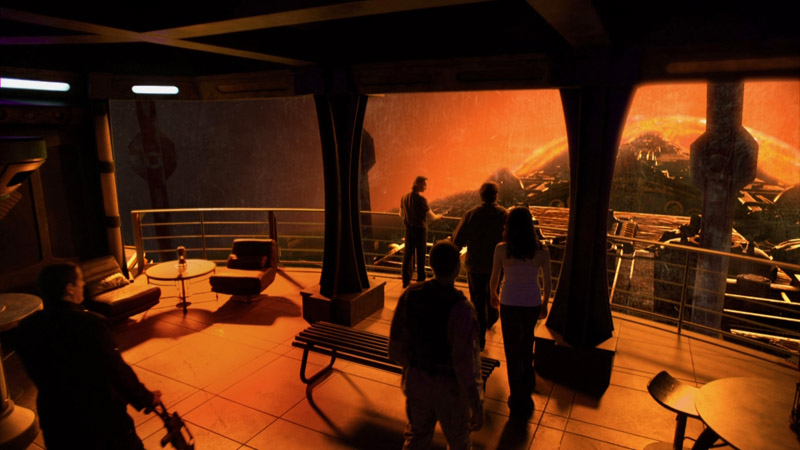Review by Leonard Norwitz
Studio:
Theatrical: Syfy & Acme Shark (Cooper/Wright)
Blu-ray: MGM Home Entertainment
Disc:
Region: A
(as verified by the
Momitsu region FREE Blu-ray player)
Runtime: 436 minutes in total
Disc One Size: 43,509,657,557 bytes
Feature Size: 22,538,692,608 bytes
Video Bitrate: 15.96 Mbps
Chapters: 10 Epiodes
Case: Standard Blu-ray case w/ 2 discs
Release date: February 9th, 2010
Video:
Aspect ratio: 1.78:1
Resolution: 1080p / 23.976 fps
Video codec: MPEG-4 AVC Video
Audio:
DTS-HD Master Audio English 3533 kbps 5.1 / 48 kHz / 3533
kbps / 24-bit (DTS Core: 5.1 / 48 kHz / 1509 kbps / 24-bit)
Dolby Digital Audio Spanish 448 kbps 5.1 / 48 kHz / 448 kbps
Dolby Digital Audio English 224 kbps 2.0 / 48 kHz / 224 kbps
Dolby Digital Audio English 224 kbps 2.0 / 48 kHz / 224 kbps
Subtitles:
English (SDH), English,
French, Spanish, none
Extras:
• Exclusive extended version of the pilot episode “Air”
• Audio commentaries by cast and producers on all episodes
• Stargate 101: Presented by Dr. Daniel Jackson
• Creating a New Universe — Over 40 minutes of
Blu-ray-exclusive
• Chatting with the cast of SG-U
• Kino Video Diaries including 5 DVD exclusives
The Film:
Much has already been written about the "1.0" season, those
ten episodes originally broadcast between October 2 and
December 4, 2009 and which preceded an intentional hiatus.
The second half of the season has its ten episodes already
titled on the IMDb but lists no specified air dates, except
for #11, which is slated for April 2, 2010. Thus the
presumed sense of splitting the seasons for video as well.
Clearly, this makes the two halves more expensive than a
single season of a similar show, such as Battlestar
Gallactica. The lack of information on the cover as to the
number of episodes contained in "1.0" suggests a deliberate
ruse. (By the way, I admit math was never my strong suit,
but does the designation "1.0" actually mean anything?
Shouldn't it be, for example, "1a"?) However you come down
on this business of releasing split seasons for home video,
I'm guessing that most Stargate fans would rather see
complete seasons of SG-1 and Atlantis on Blu-ray, whether or
not they already have them on DVD, before any further
episodes of Universe.
The Movie: 4
One way to look at the Stargate franchise is to think of the
stargate simply as a dramatic device that enables the cast
of characters to move from one part of the universe to
another and thus have to deal with new cultures and
civilizations. The original Star Trek television series
accomplished much the same with warp drive, and they also
proposed a competing military civilization. What the
Stargate series have done is to develop the idea that
technologically advanced civilizations preceded humans in
this part of the galaxy.
In the 1994 feature film with Kurt Russell and James Spader
we first learned of another civilization that predates
humans and how they moved about from planet to planet
through a device called a "stargate" and the subsequent
enslavement of interplanetary races. The first television
series, SG-1, expanded this notion for ten whole seasons,
exploring and developing, in turn, two major civilizations (Goa'uld
and Ori). Atlantis, contrary to what you might have guessed,
does not take place underwater – well, not exactly. Like
SG-1, Atlantis is a military sci-fi adventure that spins off
from the earlier series in search of the historical
"Ancients" to encounter yet another military civilization
(the Wraith). Stargate Universe appears that it will be less
concerned with military issues, but rather concentrate on
character development among the passengers of a single
spaceship.
Universe proposes to be just what the title suggests: an
exploration of the known and unknown galaxies. Dramatically
it works out to be a sort of Lost meets Voyager by way of
Battlestar Galaxy: Several dozen people, scientists,
military personnel and the odd civilian, working on stargate
technology are sent through their stargate to avoid being
destroyed by an invading force to an unexpected destination
(making use of the previously indecipherable ninth chevron)
that turns out to be billions of light years from their
point of origin with no clear means of return. And where do
they "crash," you might ask: on what appears to be a huge,
uninhabited spaceship named, appropriately enough,
"Destiny," which itself seems to have been sent on its
warp-bending, autopiloted mission by the Ancients themselves
thousands of years earlier.
The problems that face these people are several: Deciphering
what makes Destiny tick and how to ensure the survival of
its new passengers you would think should be job one,
especially since the ship appears to be falling apart: air
and power reserves did not, it seems, make allowance for
hitchhikers. Returning to Earth, however, is a competing
priority. I'll come back to this shortly, but it is here
where Universe takes a wrong turn right out of the gate. The
episodes offer opportunities for transport to various
planets for one reason or other and, making use of the
Ancient's communication stones (which someone had the good
sense to bring along, else there would be no show) they can
exchange consciousness with specific people on Earth in
attempts to settle past wrongs and consider future plans.
Like Lost, the group – what say we call them the "survivors"
- begins to sort itself out into those in favor of first
understanding what Destiny is about, and the other needing
desperately to get off this flying island and return to
Earth – pronto. Sooner would be good. But since no one, not
even the brilliant, but socially challenged, Dr. Nicholas
Rush (Robert Carlyle) nor the nerdy Elli Wallace (David
Blue) are able to sort out how to dial back to Earth, here's
where the trouble starts. Instead of the survivors asking,
"How can I help?" I believe the first question asked is
"Where are we?" It's an understandable concern, but why ask
Lt. Scott (Brian J. Smith). He wouldn't have a clue.
Just about everyone immediately and tiresomely gets into
rage mode, blaming Rush for placing them there - which is
true, though the alternatives were annihilation by the
invading force or, if they had tried to avail themselves of
the stargate to dial Earth there was the possibility of
bringing the battle with them, something like an afterbirth.
They figured: Rush got them here, he should get them back
home, at once. I found this aspect of the first several
episodes unnatural and contrived. I am unconvinced that
people in such circumstances would behave thus without first
catching their breath. We can sympathize with the suddenness
of their crash landing, but especially given that many of
the survivors are scientists, their lack of curiosity is
appalling and, I felt, not believable. We do have a sense of
how passionate the factions are, but to me the question is
senseless - I never quite got why everyone was in such a
hurry.
The truth is that the others (from Rush's point of view
everyone else on board is an "other") simply don't trust him
– as if, somehow, Rush knew all along they were going to end
up here or, barring that scenario, that he would rather stay
there, Locke-like, and enjoy the ride and the scientific
opportunities it offers. Battle lines are drawn, and there
is a natural fight for leadership, the other candidate being
Colonel Everett Young (Louis Ferreira, aka Justin Louis).
Young is the ranking commander and very few on board are
happy with his having to defer to Rush. (Rush feels the same
way.)
Stargate Universe is relatively humorless so far, except for
the character of Eli, who seems to be placed there precisely
and entirely for "balance," in part so that we don't confuse
this series with Battlestar Gallactica, some of whose themes
Stargate Universe echoes. I am of two minds about Eli: the
first is that his reactions to situations are lazy clones of
any number of nerdy situations and characters. In some ways
Eli reminds me of Buffy's Xander Harris, pining for the girl
he can't have. But it is his similarity to Xander that makes
Eli seem so duh. Xander, as lacking in smarts as he is,
would not have wasted an opportunity to make the obvious
allusion to The Last Starfighter as when Eli challenges Dr.
Rush and Jack O'Neil about the plausibility of imbedding a
math/physics test into a video game in an effort to find a
person who could help save the universe. What kind of nerd
doesn't know his own cultural references! On the other hand,
Eli's moves on ChloŽ (Elyse Levesque) even after he knows
she and Lt. Scott are already couple, offer some of the
show's most poignant moments.
Like Battlestar Gallactica, Stargate Universe is
photographed in dark, but relatively grainless, tones on
board the Destiny where a good deal of the action takes
place. Many Earth scenes, for some reason that escapes me,
are peculiarly desaturated. It's as if Stargate Universe is
self-conscious of its derivative nature, and tries to
distance it self with the occasional technical device.
The comparison to Lost is perhaps more compelling than to
either of the two previous live action Stargate series, but
there is one significant difference for the audience,
besides the obvious. That difference being that after only
an episode or two of Lost, we have found characters to
identify with, to feel deeply about and to give a damn about
what happens to them. This is because one show is written
and cast for exactly that kind of discrimination and the
other isn't. Eli certainly sticks out from the crowd, but
that's as much a liability as it is an advantage. And Rush,
for all his anti-heroic qualities, becomes increasingly
predictable and tedious in his righteousness. It is hoped
and likely that the lack of differentiation and the
contrived situations that grow out of it in the opening
episodes of SGU is deliberate, so that as it unfolds its
characters will be not only fleshed out, but dramatized, in
the best sense. I'm just not sure if I want to stick around
long enough for that to happen.
Image:
7/8
NOTE:
The below
Blu-ray
captures were taken directly from the
Blu-ray
disc.
The first number indicates a relative level of excellence
compared to other Blu-ray video discs on a ten-point scale.
The second number places this image along the full range of
DVD and Blu-ray discs.
Despite its being fairly dark on board the Destiny most of
the time, there is nary a trace of noise. The camera doesn't
often hold still long enough or close enough to get a handle
on resolution. I think it's just fairly good, but not
exceptional. As expected, the kino video footage is
manipulated to be gauzier than everything else. (You gotta
ask why a culture that can design a faster than the speed of
light craft that is still operational after thousands of
years can't make a video device that generates images better
than our present high definition, not worse.) Scenes on
Earth are less good. Scenes photographed on Earth as
stand-ins for another planet look are better. The brightness
of the desert planet, for example, doesn't blow itself out,
so detail is preserved. CG is good, a little better than on
previous Stargates, but unremarkable. As expected, no I
found no blemishes, artifacts or enhancements.
CLICK EACH
BLU-RAY
CAPTURE TO SEE ALL IMAGES IN FULL 1920X1080 RESOLUTION
Audio & Music:
7/6
I expected a more gut-grabbing audio track, but still, for a
television series more dramatic and less effects-driven it
is better than passable: dialogue is clear while spaceship
sounds on board and from outside (I guess we have come to
expect that outer space is only a vacuum if you go out
without your spacesuit) and attacks have some bite , whoosh
and snap. Bass has some richness, surrounds struck me as
less interestingly nuanced, except for the necessary
locational cues, which are well-managed.
Operations:
4
Beginning with the cover, we see that there is nothing that
tells us how many episodes this "1.0" covers, nor which ones
they are. Well, there are ten, counting the 3-part pilot
episode as three.
I like that the episode menu, though requiring advancing
through each episode until you find what you're looking for,
offers a brief description of the story and the choice to
play it with or without the commentary. However, we don't
learn who the commentators are until they identify
themselves on the track unless you attack this from the
Special features list, in which case the commentators are
specified for each episode. On the menu, each episode is
given its own notch on the time line (good) but only as it
applies to the episodes on that disc, not to all the
episodes in the series (bad). It's also a little tiresome to
have Daniel Jackson (Michael Shanks) re-introduce himself
with each 1 –2 minute clip in "Stargate 101" even in "Play
All" mode. Finally, can anyone explain to me the marketing
sense of advertising DVD titles on high definition video?
\
Extras:
7
The Extended Pilot is only eight or nine minutes longer than
the three episodes that aired in October last; still, I feel
those extra minutes help – definitely to be preferred. We
get a chance to somewhat better understand what is going on,
why and to whom. A little.
The Bonus Features are spread over the two discs:
commentaries by various cast and crew for each episode, and
the many subsets of "Destiny 101" are split across both
discs. I checked into a few of the commentaries and found
those by the actors to be sillier than informative. The Kino
Video Diaries, hosted by our resident nerd Eli (David Blue)
appears on Disc 2. Though I imagine some folks in the
audience will find his sense of humor appealing, I quickly
tired of his patently contrived monologue.
The big bonus item is the strangely laid out interactive
experience titled "Destiny 101" which contains all the
behind the scenes production material you could want,
however briefly, including setting up the concept for the
new series, director's notes, information about set design,
special effects (with a brief bit about designing the "kawoosh"
– the bubbly goo that extends from the stargate when
activated), location shooting, cast interviews about their
characters (typically about two minutes). Included here also
is Daniel Jackson's (Michael Shanks) excellent summary
overview of the Stargate story and terminology in "Stargate
101." His sense of humor is, thankfully, drier than Eli's.
All the extra features are presented in high quality 16x9
standard definition.
|
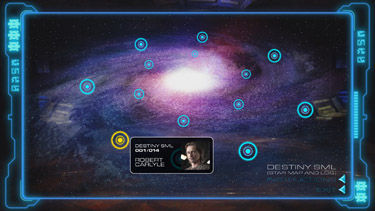 |
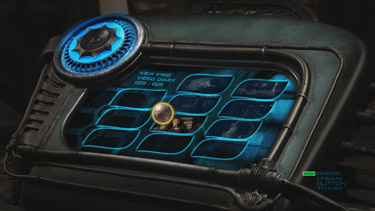 |
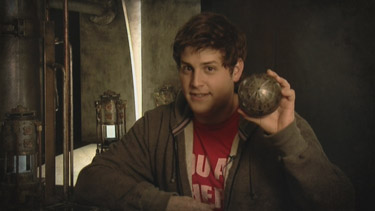 |
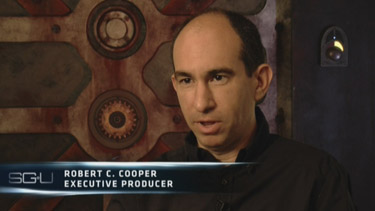 |
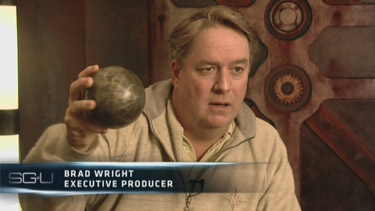 |
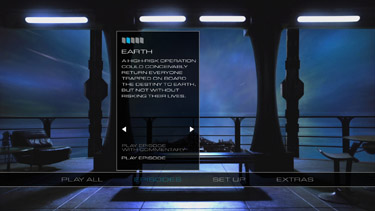 |
Bottom line:
6
Regardless of how Stargate Universe stacks up against its
previous series in the franchise, or how much its themes and
architecture are manifestly derivative, I feel the new
series has little to recommend it on its own terms – its
main difficulty being that its characters have so little
soul, so little for me to find special and interesting about
them. A description of each character has about as much
appeal for me as how they materialize on screen. The new
series does not really depend on knowledge of the previous
shows: some will find that to be a blessing, others a
liability. But just because I didn't warm to the series,
doesn't mean that there is anything about the transfer to
high def that should deter those of you who did. The Blu-ray
is better than acceptable in terms of image and sound. The
extra features are extensive, if oddly laid out.
Leonard Norwitz
February 16th, 2010
![]()
![]()

![]()
![]()
![]()
![]()

![]()
![]()

